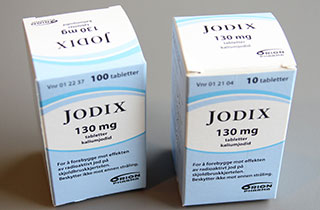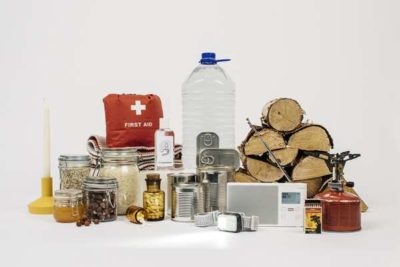Demand has soared in Norway for Jodix (iodine) tablets, even before news broke Friday morning of Russia’s attack on Ukraine’s (and Europe’s) largest nuclear power plant. Disaster preparedness quickly moved to a higher level, and Prime Minister Jonas Gahr Støre claimed on national radio that the attack “borders on madness.”

Støre and his government minister in charge of justice and preparedness, Emilie Enger Mehl, were both alerted to the attack during the night by officials at the Norwegian Radiation Protection Authority (DSA, Direktoratet for strålevern og atomsikkerhet), They all worked through the night to determine the scope and danger posed by the attack on the Zaporizhzhia nuclear power plant, especially after reports that Russian soldiers started shooting at firefighters who turned up to put out fires inside the facility.
DSA could later confirm that the plant’s nuclear reactor was not damaged, that nuclear security was “intact” and that no higher levels of radiation in the area had been registered. DSA has access to both Ukrainian and European measuring stations and they did not show higher levels.
DSA, formerly known as Statens strålevern, nonetheless described the situation at the nuclear power plant as “serious and unclear,” and that it could change at any time. State officials at DSA were following the situation closely and have ongoing contact with Norway’s state meteorological institute to literally forecast which way the winds will be blowing. The attack on Zaporizhzhia brought back chilling memories of how radioactive fallout from Ukraine’s Chernobyl nuclear power plant disaster in 1986 blew all the way to Northern Norway and contaminated grazing land for years.

Prime Minister Støre and Justice Minister Mehl stressed how DSA said any fallout from the Zaporizhzhia plant in southern Ukraine wouldn’t reach Norway for 48 hours. A low-pressure system over the Caspian Sea was generating north-northwesterly winds over the rest of beleaguered Ukraine itself, but hopefully without radioactive fallout.
They were deeply worried, however, that the attack on the plant indicates more battles may take place near other nuclear power plants in Ukraine. Støre stressed that Norway’s preparedness was high, but he condemned the Russians’ attack on or even near such a potentially dangerous facility.
“There will be more strong condemnation of this,” Støre said on NRK’s early morning news program Nyhetsmorgen. “It borders on madness to attack in this manner.”
Norwegians were being urged on Friday to follow the state’s guidelines for disaster preparedness. That includes a recommendation to have Jodix iodine tablets at home, especially for children but also for youth and adults under age 40. With many pharmacies already sold out or with supplies running low, the state health directorate was asking all local governments to prepare for distribution of stored emergency supplies within 12 hours of any sign of nuclear fallout. The tablets would then be made publicly available to children and youth under age 18 and to pregnant or nursing mothers.

NRK reported that around 2.2 million tablets will be available for distribution. “Even though we haven’t had any reports of fallout from the nuclear power plant in Ukraine, the risk of accidents is higher than normal because of the war in the country,” said assistant health director Dr Espen Rostrup Nakstad on Friday. That’s why his state government agency is calling on local governments to “go through their systems and make sure that their iodine tablets can be distributed on short notice.”
Norwegians were also being reminded of other disaster preparedness measures they should take, as effects of the war in Ukraine threaten all of Europe and Russian President Vladimir Putin becomes more and more aggressive. Residents were advised to be sure they had ample supplies of all medicines they need, along with candles, flashlights, matches, first aid kits and plenty of batteries.
They were also advised to have cash on hand, in the event of a cyber attack on the banking system, along with enough food and drink for at least 72 hours. Households are advised to have at least nine liters of water stored per person, canned food, dried fruit, nuts and chocolate, dry bread known as knekkebrød and some means of preparing food in the case of power failures. Gas grills can come in handy, and everyone was urged to have battery-powered DAB radios and extra fuel such as firewood, gas or parafin.
newsinenglish.no/Nina Berglund

